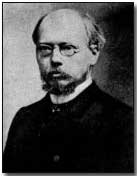Who's Who - Count Hertling
 Count Georg
von Hertling (1843-1919) served as a puppet Chancellor of Germany for eleven
months from November 1917.
Count Georg
von Hertling (1843-1919) served as a puppet Chancellor of Germany for eleven
months from November 1917.
Born on 31 August 1843 in Darmstadt, Hertling was a prominent conservative politician and philosopher, and was leader of the conservative wing of the Catholic Centre Party in the Reichstag (having entered the Reichstag in 1875) while serving as Bavarian Prime Minister from 1912-17. He had earlier held theological university chairs at Bonn and Munich.
Hertling, who had earlier supported Chancellor Bethmann-Hollweg, reluctantly succeeded the ineffectual and obscure Georg Michaelis as Chancellor on 1 November 1917; so far as much of the general populace was concerned however, Hertling was every bit as obscure as his predecessor (whom even the Kaiser, Wilhelm II, only vaguely knew).
As Chancellor and Prussian Minister-President Hertling proved entirely willing to demonstrate subservience to the demands of the Third Supreme Command, an effective military dictatorship led by Hindenburg and Ludendorff (and so named given that Hindenburg was the third wartime Chief of Staff following Moltke and Falkenhayn).
Hertling was faced with the difficult task of liaising between a Reichstag increasingly in favour of a negotiated peace settlement with the Entente Powers, and a military high command determined to see the war through to a decision.
As with Michaelis before him, Hertling was unable to call upon a reserve of political goodwill or an effective power base within the Reichstag to support his initiatives. He was therefore entirely dependent upon support from Hindenburg and Ludendorff, although he concurred with both in believing in ultimate German victory.
With Ludendorff's decision to transfer power back to the Reichstag in September 1918 (resigning at the same time), Hertling himself decided that he would be unable to work constructively with the Reichstag. He therefore resigned (much relieved to be leaving office) at the start of October 1918.
He died the following year in Ruhpolding, on 4 January 1919.
Click here and here to read Hertling's views on President Woodrow Wilson's Fourteen Points plan. Click here to read Hertling's reaction to news of the Russian Brest-Litovsk peace settlement in March 1918.
A "blimp" was a word applied to an observation balloon.
- Did you know?
